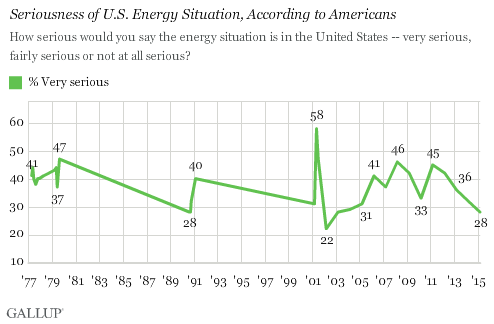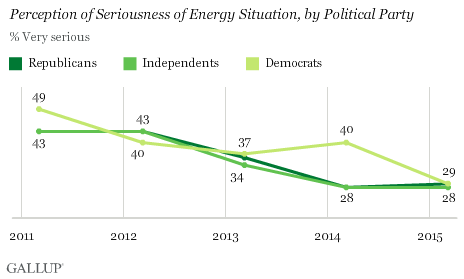Story Highlights
- Twenty-eight percent call U.S. energy situation "very serious"
- Only in 2002 did lower percentage say situation is very serious
- Half of Americans say situation is "fairly serious"
WASHINGTON, D.C. -- Fewer than three in 10 Americans (28%) say the energy situation in the U.S. is "very serious," one of the lowest figures in Gallup's history of asking the question. While this figure has varied widely over the past few decades, the percentage of Americans who feel the energy situation is very serious has declined consistently over the past four years. In Gallup's 38-year trend, only in 2002 did fewer Americans think the U.S. energy situation was very serious.

This figure peaked in May 2001 on the heels of California's rolling blackouts, when more than half of Americans described the U.S. energy situation as very serious. But by 2002, that number had fallen to its lowest point, with 22% calling the situation very serious. These two data points straddle the events of 9/11, so the 2002 low may be related to a shift in the attention Americans were paying to the issue. Since then, the percentage has reached as high as 46%, but has been consistently down during the past four years, falling from 45% in 2011 to the current post-2002 low of 28%.
These latest data are from Gallup's annual poll on environmental and energy issues, conducted March 5-8.
In addition to the 28% who say the energy situation is very serious, 50% say it is fairly serious, and 20% not at all serious. As the percentage describing the energy situation as very serious has shrunk since 2011, the percentage saying it is not serious has grown from 7% to 20%.
Perceptions of the energy situation as "very serious" have fallen across all partisan groups over the past four years. The latest drop is largely attributable to Democrats, 29% of whom say it is very serious, down 11 percentage points from 2014. Meanwhile, independents' (28%) and Republicans' (29%) views have held steady.

Bottom Line
As gas prices have been generally lower as of late, so too have Americans' worries about the availability and affordability of energy. Figures from the U.S. Energy Information Administration illustrate how gas prices in the last five years have been more stable than in the previous five. This general stability may be related to Americans' lessened concern about energy. This issue has decreased in prominence in the minds of so many Americans that one in five now say the energy situation is not serious at all. The steep increase in domestic production of crude oil, which strengthens overall U.S. energy independence, may also have something to do with Americans' diminished concerns.
The large majority of Americans continue to view the situation with some degree of seriousness. That may be because energy has a direct impact on Americans' daily lives, so it is hard to dismiss it as unimportant, regardless of the country's current energy situation. For example, changes in gas prices can greatly affect Americans' views on other measures. Still, right now, Americans are less concerned about the U.S. energy situation than they have been at nearly all times over the past four decades.
Survey Methods
Results for this Gallup poll are based on telephone interviews conducted March 5-8, 2015, on the Gallup U.S. Daily survey, with a random sample of 1,025 adults, aged 18 and older, living in all 50 U.S. states and the District of Columbia. For results based on the total sample of national adults, the margin of sampling error is ±4 percentage points at the 95% confidence level. All reported margins of sampling error include computed design effects for weighting.
Each sample of national adults includes a minimum quota of 50% cellphone respondents and 50% landline respondents, with additional minimum quotas by time zone within region. Landline and cellular telephone numbers are selected using random-digit-dial methods.
View survey methodology, complete question responses, and trends.
Learn more about how Gallup Poll Social Series works.

